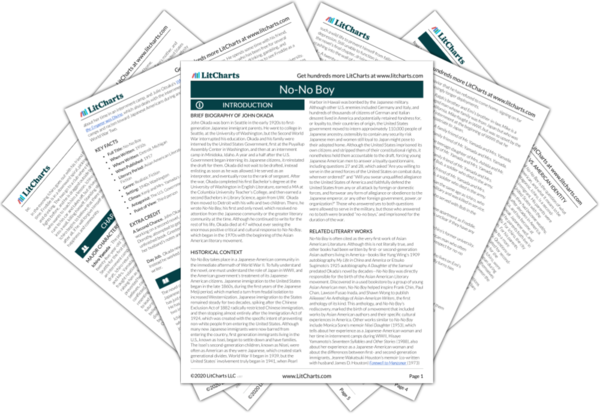Kenji lost much of his leg during WWII, but due to an untreatable infection, he has been forced to have it amputated shorter and shorter. When the novel begins, his leg is eleven inches long, but it has begun to hurt again, and he knows he will soon lose more of it. When Kenji and Ichiro discuss their respective futures, they use Kenji’s eleven inches of leg as a stand in for the time left in his life. While Ichiro has “fifty years, maybe sixty,” Kenji sees his life in terms of the physical length of his leg, which he anticipates will translate to a year or two more of life. Ichiro would happily trade his half-century of life for Kenji’s eleven inches of leg. To Ichiro, Kenji’s leg is a symbol of his earned American-ness. Kenji was injured in the war and is now a veteran and therefore an American who deserves his place in America and deserves the respect of its other citizens. Although Ichiro knows Kenji might die from his injury, Ichiro would still rather know death was approaching than continue to feel like a man who was neither Japanese nor American, with no life and no future.
Eleven Inches of Kenji’s Leg Quotes in No-No Boy
For a brief moment Ichiro felt a strange exhilaration. He had been envying Kenji with his new Oldsmobile, which was fixed to be driven with a right leg that wasn’t there any more, because the leg that wasn’t there had been amputated in a field hospital, which meant that Kenji was a veteran of the army of America and had every right to laugh and love and hope, because one could do that even if one of his legs was gone…
[Ichiro] gripped his knees with his hands, squeezing the hard soundness of the bony flesh and muscles, and fought off the sadness which seemed only to have deepened after the moment of relief. Kenji had two years, maybe a lifetime if the thing that was chewing away at him suddenly stopped. But he, Ichiro, had stopped living two years ago.
I’ll change with you, Kenji, he thought. Give me the stump which gives you the right to hold your head high. Give me the eleven inches which are beginning to hurt again and bring ever closer the fear of approaching death, and give me with it the fullness of yourself which is also yours because you were man enough to wish the thing which destroyed your leg and, perhaps, you with it but, at the same time, made it so that you can put your one good foot in the dirt of America and know that the wet coolness of it is yours beyond a single doubt.
“If it were [possible], Ken, if it were and there was just half an inch to trade for my fifty years, would you then?”
Kenji thought about that for a long while. “When it comes to the last half an inch and it starts to hurt, I’ll sell the car and spend the rest of my life sitting here with a drink in my hand and feeling good.”
“That means no, of course.”
“That means no, yes.”
“Thanks for being honest.”
…
So they sat silently through the next drink, one already dead but still alive and contemplating the next fifty or sixty years more of dead aliveness, and the other, living and dying slowly. They were two extremes, the Japanese who was more American than most Americans because he had crept to the brink of death for America, and the other who was neither Japanese nor American because he had failed to recognize the gift of his birthright when recognition meant everything.












